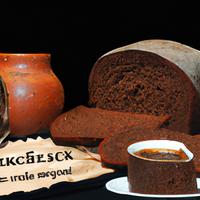
1 serving (57 grams) contains 142 calories, 4.6 grams of protein, 1.7 grams of fat, and 26.8 grams of carbohydrates.

Log this food in SnapCalorie

Nutrition Information
Calories |
593.8 | ||
|---|---|---|---|
% Daily Value* |
|||
| Total Fat | 7.1 g | 9% | |
| Saturated Fat | 1.2 g | 6% | |
| Polyunsaturated Fat | 0 g | ||
| Cholesterol | 0 mg | 0% | |
| Sodium | 1068.8 mg | 46% | |
| Total Carbohydrates | 111.6 g | 40% | |
| Dietary Fiber | 14.2 g | 50% | |
| Sugars | 4.8 g | ||
| protein | 19 g | 38% | |
| Vitamin D | 0 mcg | 0% | |
| Calcium | 95 mg | 7% | |
| Iron | 4.8 mg | 26% | |
| Potassium | 356.2 mg | 7% | |
* Percent Daily Values are based on a 2,000 calorie diet. Your daily values may be higher or lower depending on your calorie needs.
Food Attributes
Source of Calories
About Pumpernickel rye bread
Pumpernickel rye bread is a dense, dark loaf originating from Germany, celebrated for its robust flavor and rich texture. Traditionally, it is crafted using coarse rye flour or meal, mixed with a starter and water, then baked at a low temperature for an extended period, allowing its deep, earthy taste to develop fully. Authentic versions often omit added sugars or oils, making it a wholesome choice. Pumpernickel is naturally high in fiber, supporting digestion and providing long-lasting energy. It contains essential nutrients like B vitamins, manganese, and selenium. The slow baking process gives it its characteristic dark hue and caramelized undertones. However, some modern recipes may include sweeteners or refined flour, reducing its nutritional value. Ideal for pairing with spreads, smoked salmon, or cheeses, pumpernickel rye bread offers a hearty option for those seeking a flavorful and nutrient-rich addition to their meals.



